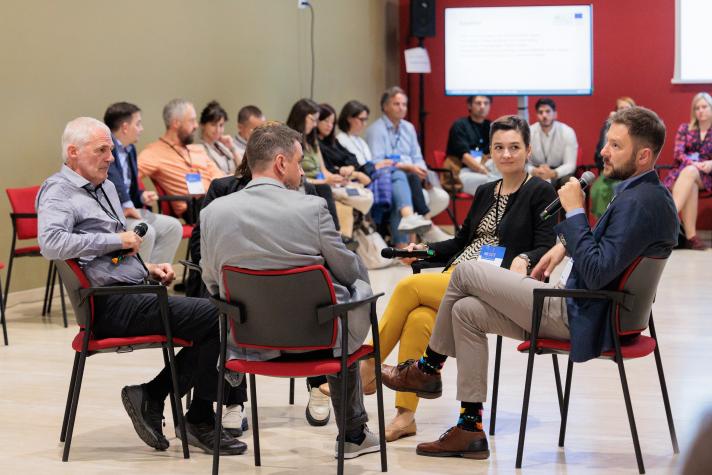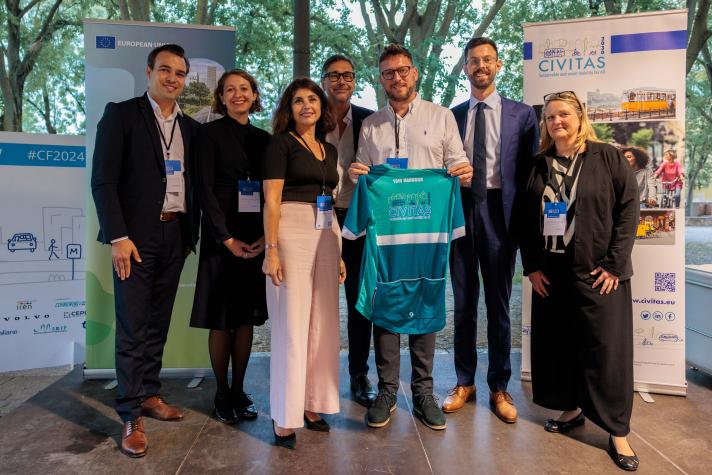
Around 600 delegates gathered in the city of Parma in Italy on 1-3 October 2024 for the Civitas Forum. This is the main event of the CIVITAS Initiative, one of the flagship programmes helping the European Commission achieve its ambitious mobility and transport goals. It does this by acting as a network of cities, for cities, dedicated to exchange and learning on sustainable urban mobility.
Around 75% of EU citizens live in urban areas, where the effects of greenhouse gas emissions and noise pollution from transport most keenly damage health and life quality. Emissions from transport make up a quarter of the EU’s overall emissions, showing both the necessity and the potential of taking bold action on sustainable transport.
Over the three days and across 20 sessions, attendees heard first-hand from the cities, people, and projects driving innovation, piloting and rolling-out measures to transform urban mobility systems across Europe towards a cleaner, greener, fairer future. Discussions covered a wide range of topics – from innovation in public transport to multimodal hubs, from traffic management to universal accessibility. A number of cities and projects connected to the EU Cities Mission – a network of cities committed to reaching climate neutrality by 2030 – were present, including the host city, which was recently awarded the prestigious “Cities Mission Label”.
Opening the event, Mayor of Parma, Michele Guerra explained how the "ecological transition rooted in innovation" is a priority for the city:
"Together with a network of fellow cities, we have committed to reaching climate neutrality as part of the EU’s Climate neutral and Smart Cities Mission. Re-shaping our mobility and transportation are critical to reducing emissions and pollution. In Parma we aspire to transform the way citizens move within our city and serve as a beacon to other cities in Europe,” said Michele Guerra.
The event drew in representatives of cities and regional authorities, policymakers and practitioners, researchers and mobility enthusiasts – all keen to learn more about the results of EU projects or find out more about policy developments and funding opportunities. Speakers presented a holistic overview of how the European research scene is moving forward in these fields, bringing benefits to the environment, to the economy, and above all, people.
Scaling up innovative solutions
Chairing the Plenary Session on scaling up urban mobility solutions, Marcel Rommerts, Head of Transport Research Unit in CINEA, highlighted the challenges facing research projects, not least in crossing the so-called “valley of death” where promising technologies never manage to "bridge the gap between the development of solutions and their deployment". He explained how CINEA plays a crucial role in tackling this and is well positioned to help "leverage the complementarities between programmes to fill in financing gaps":
"The good news is that support is at hand and many mechanisms at an EU level exist today to support the deployment of innovation solutions in the field of urban mobility," said Marcel Rommerts.
Speakers on the panel from organisations as diverse as the European Investment Bank to Helsinki’s Innovation Company, also provided valuable insights into opportunities, success stories and useful tips on how to best avail of EU support to overcome the barriers.
Collaboration for innovation
Speakers across the board emphasised how funding from the EU's research programme, Horizon Europe, has been instrumental in facilitating collaboration for innovation and for experimentation. They pointed to the value of working in consortiums and within clusters of similar projects, to draw on complementary expertise, learn from different cultures, and bring a combined message to policymakers.
This is particularly applicable to CIVITAS, which since its creation in 2003, has promoted the sharing of ideas and helps build relationships among important players involved in transforming urban mobility across Europe. Octavia Stepan, Head of Integrated Transport and Cities Sector in CINEA explained how the CIVITAS family of projects creates that "collaborative framework for experimenting" and "lends a credibility that can help leverage further funding".
“It’s about not only sharing the benefits, but also the risks", said Octavia Stepan
The event also marked the signing of a notable Memorandum of Understanding connecting NetZeroCities, the platform that supports the EU Cities Mission and the 112 Mission Cities aiming to be climate neutral by 2030, and the CIVITAS Initiative. The agreement outlines how the two initiatives will work together to strengthen support for cities to develop sustainable mobility systems as a cornerstone of their transition to climate neutrality. This includes: joint learning opportunities; sharing best practices; regular meetings, where experts will contribute to the related policy work of their counterparts; and monitoring the progress of both initiatives on jointly agreed objectives.
More
Details
- Publication date
- 3 October 2024
- Author
- European Climate, Infrastructure and Environment Executive Agency



